Once upon a board game culling, I had the privilege of writing about a magical game. Quite literally. It was a game about mages, racing across the land, controlling area while researching magic spells worth both victory points and utility on the main board. It boasted solid components, lovely cards, a theme that worked quite well, and some of the nicest player boards I’d ever seen in board gaming.
And yet, despite all that I bounced off it. There was just something missing. The game seemed too simple. Such was the designer’s plan, of course. They wanted their first game published to be as widely accessible as possible, aiming to buff it out later with an expansion containing additional modules. It’s been well over a year since that last article was published, and here, finally, trapped in quarantine I’ve brushed off that dusty tome once again. Archmage: Ascendant. I’ve read through the contents, adding new spells to my repertoire, exploring new places of power, and reuniting with the base game too.
In a world where “the cult of the new” possesses the board game buying masses, where people only ever seem interested in the current hotness even as they cry out for reviews of older games already reviewed a dozen times, it’s a true pleasure to revisit a title that’s been on the shelves for a couple years and shine the spotlight on it once more. But this isn’t just a review of the expansion. It’s a look at perception, the passage of time, and what some games are really capable of showing us.
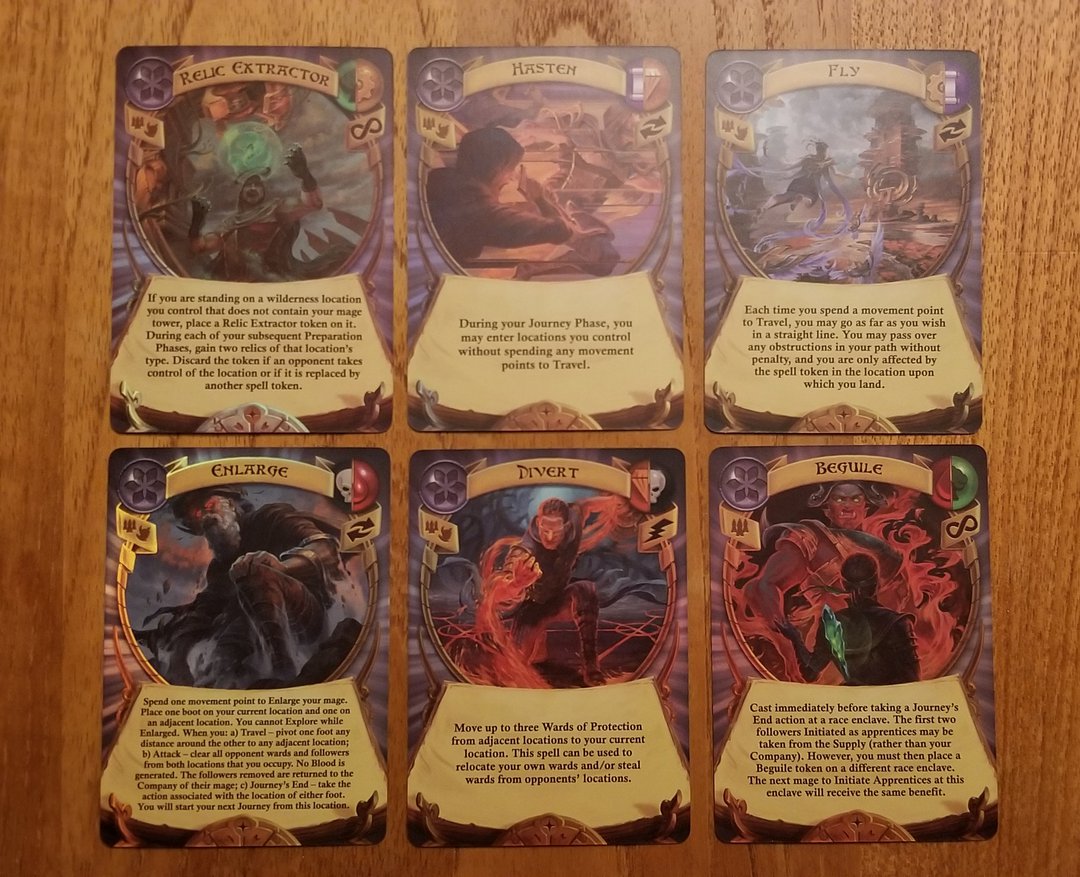
Who doesn't love NEW SPELLS?!
New Magic
If you haven’t read my original piece about Archmage, know that I didn’t find much at fault with it. It was solidly designed and lovingly built. It was just a little too sparse for my liking. One of my original critiques was that there wasn’t enough variety in the spells. Magic in games always feels to me like an extension of the player, of their will and their style in solving problems. In the base game there was only one spell for each color output and combination, leading to a bit of sameness across multiple plays. If we both learned Matter (yellow) magic early on, we’d both run our engines off Transmute and we’d be equally as likely to develop the same advanced magic as wells. In a game all about action economy and efficiency, the basic Time spell always seemed like a must, allowing you to outpace opponents who didn’t prioritize it over the course of a game. There was a shelf life. While many of the spells were situational and would vary in how good they were from game to game, some clear staples emerged.
Naturally then I was glad to see a brand new set of fundamental and advanced spells. There are rules for replacing the base sets with these spells, keeping the game symmetrical, or mixing all of them together, giving players more agency over different spell choices even when researching the same schools. The fundamental spells also incorporate a “boost” in which you can pay beyond their normal casting costs to gain extra effects. Check box number one checked on my magical list of renovations for the ol’ mage tower! There are now ways to further diversify your magical research and set yourself apart from your opponents.
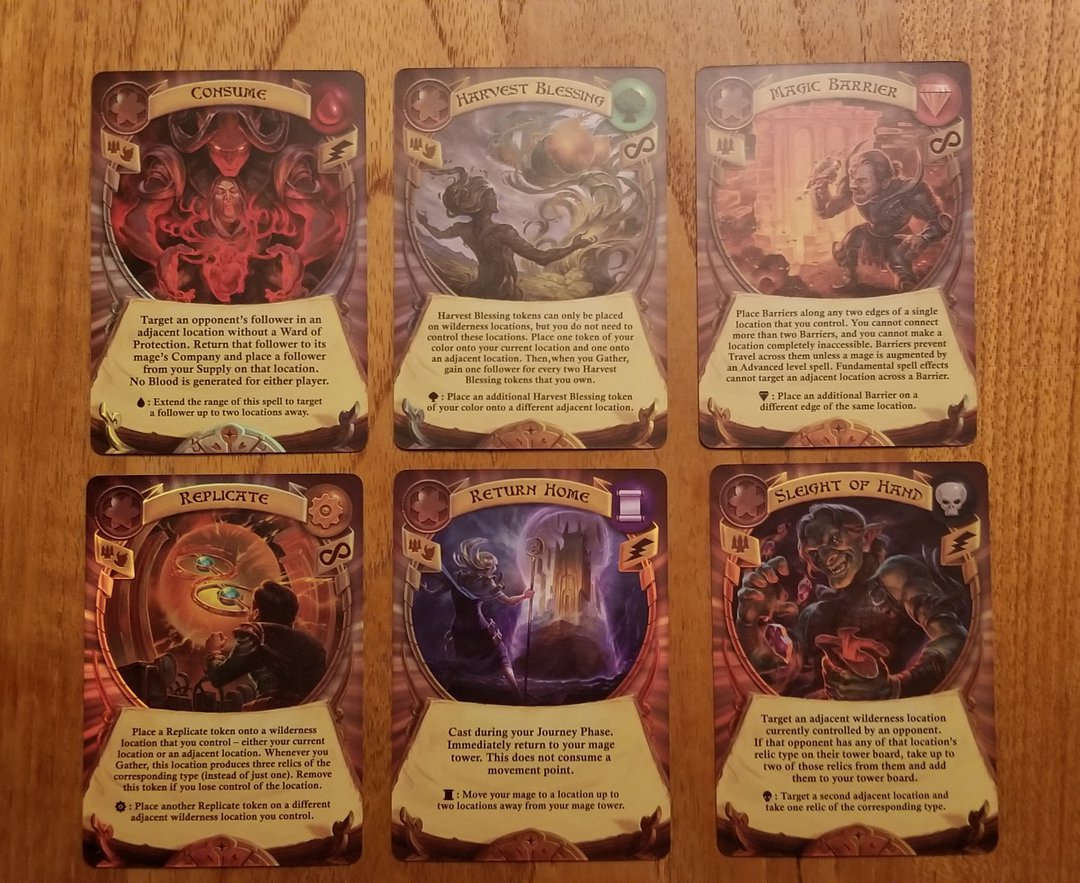
The new fundamental spells can be played in place of the originals, combined, and played with or without boosts allowed.
As if reading my mind with a divination spell, the next module included in the expansion gives players more to fight over on the overworld map. The basic area control battle, while dynamic in its own right, suffered from much the same as the spells. While situational, it could get a bit samey after several games. With Places of Power mixed into the setup, players now have extra incentives to fight over, little extra battlegrounds in the larger war. Whether greedily snatching up useful effects or stopping their opponents from gaining the benefit, these tiles give powerful abilities that fire off every turn to those that control them. While a very simple addition, they cannot be ignored. I’ll never play without them ever again! Check box two ticked!
And finally, something else that I’d noticed after multiple plays were addressed. End game scoring was a bit too flat, in my opinion: you only earned a few points for spells researched as well as area controlled on the map. Something was missing. While I’d hoped the Places of Power would offer a victory point incentive, what I found was even better. Secret scoring cards, prophecies, are dealt to each player during setup. They can aim for these bonuses or not as their play leads them. The catch? There are minor and major point bonuses printed on the cards. If you want to claim the points for the minor bonus, you have to reveal the card, tipping your hand as to the major bonus you’re still shooting for, inviting other players to stop you. If you withhold revealing the card, you can qualify for all the points when you claim the major bonus but only if you still meet the conditions for the minor one as well. Did you miss out on some points because you no longer qualify for the minor bonus? This additional way to score is once again something I’ll never play without (aside from maybe during the teaching game for new players). As a whole, this expansion literally ticks all the wizarding boxes.
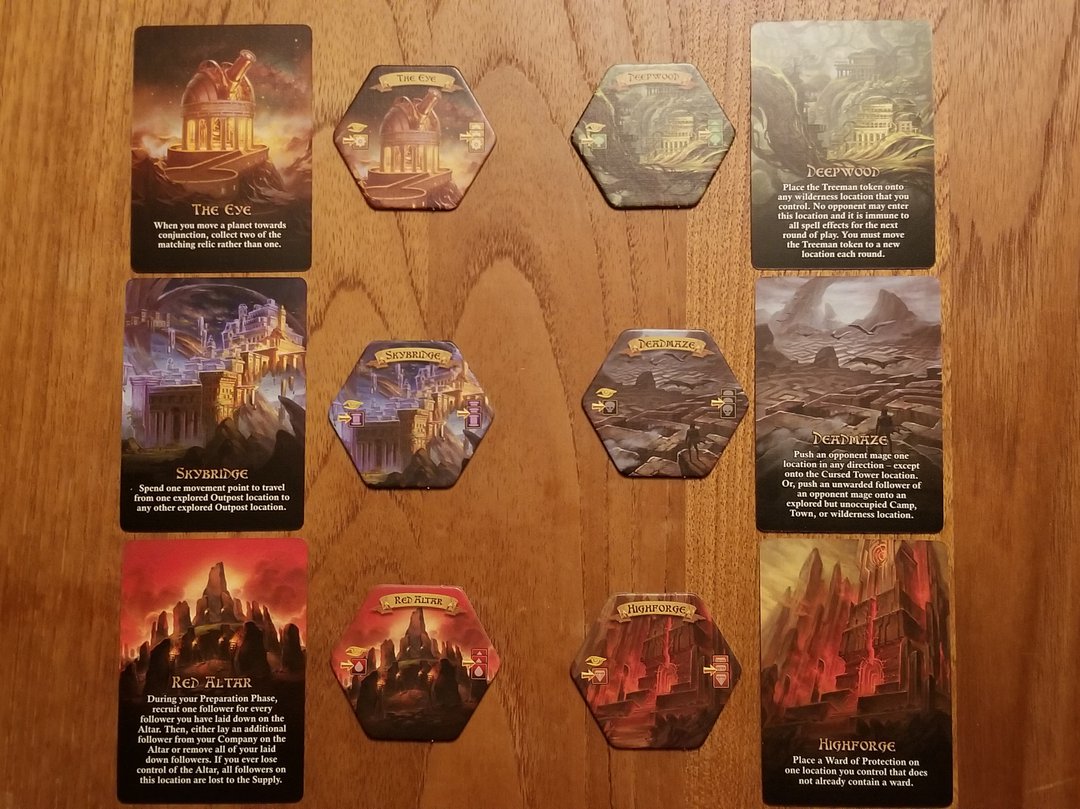
Places of power add a nice dash of spice into the basic formula.
Old Magic
Despite what you may think, the truly remarkable thing I found in reconnecting with Archmage wasn’t all the newest shiny in the expansion box. Don’t get me wrong. All that stuff is wonderful and I’m glad to have it. I will probably mix it into every game I ever play ever again, short of when I teach new players the game for the first time. But it’s that experience itself that really grabbed me once again. You see, in looking for a chance to review the expansion I had to reteach the base game. I had to once again play that too-simple, symmetrical struggle, training up an opponent who could help me on my quest. What I found surprised me.
I’m the kind of gamer that makes fairly final decisions when it comes to games. I play a lot of them. A lot of them. So it’s not uncommon for me to try something, feel lukewarm with it, and know that no matter how much time passes that game will still be what it is, likely along with my opinion to match. And yet, there’s an exception to every rule. Archmage seems to be exactly that exception. Or perhaps maybe Archmage is the catalyst, and it’s me that’s changed.
In the time since I’ve reviewed Archmage, I’ve played other wizarding games. I previewed a wonderful abstract game, FILLIT, which I described as being like two mages dueling. I’ve picked up the wonderful engine builder known as Res Arcana, a game all about using your limited spells and artifacts to claim places of power. I’ve sampled some of what else is out there for the aspiring magic user to scratch that arcane itch. I thought an expansion was what was needed to really catapult Archmage to greatness. But I’m realizing more and more that, in the light of its expansion, the shadow Archmage casts is much greater than I’d thought.
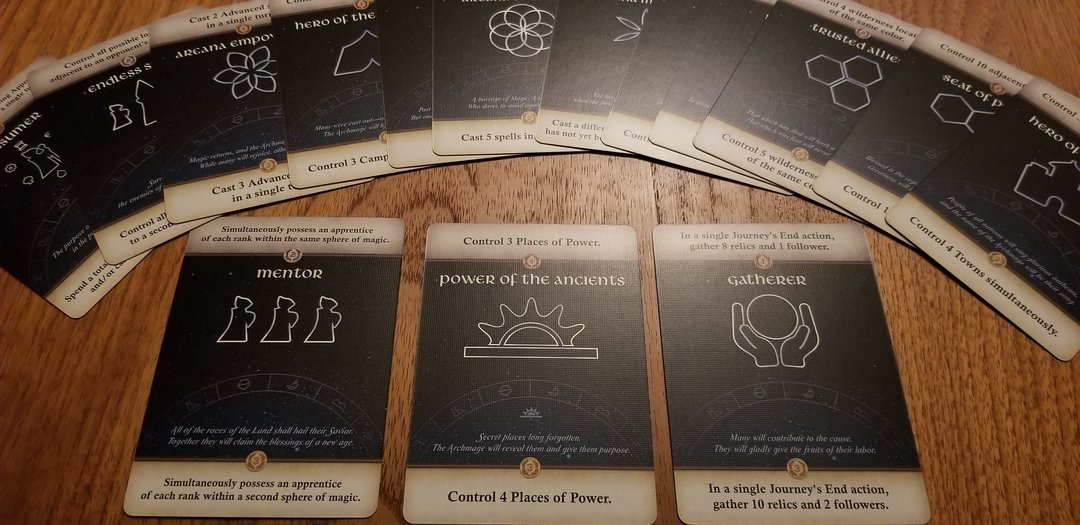
Only a fool listens to every prophecy they hear, right?
It’s a funny thing, perception. One moment you can be so sure of something and the next you realize how wrong you’ve really been. This isn’t an uncommon sentiment at large, let alone to reviewers. Sure, the base game had been samey, the same spells, the same give and take on the main board, but something had changed. Everything seemed new. Old spell favorites were still available, but the pathways forwards were different, shifting with how best to outplay my opponent. What had appeared a static back-and-forth on the main board became a sea of conflict, its ebb and flow washing back and forth, an objective secondary to my magical research but one I could never afford to look away from for too long. I found myself delighting in the small swings of the base game. Simple as it was, it seemed less and less like a too-sparse magical wargame and more like wizard chess. Similar every play, but still dynamic. Tight. Nuanced.
The last time I played Archmage as just the base game, I had a lot of fun. I don’t take back what I said about it needing an expansion. I think the game’s long-term life is only helped by all the extra content you get with Archmage: Ascendant, but there’s no denying that the original game itself has more chops than I gave it credit for. In some ways, now that the expansion is out, I’m able to better appreciate just how much give and take, how much interaction there is between the main board and your magical research player board, between the combinations and interactions of spells you and your opponent have researched, even if you do go down similar paths. Not that I’m eager to play only the base game for the rest of time. Don’t get me wrong, I still fully intend to stack on the expansion content. I appreciate more now, however, all the new options those movements spells, blocks, attacks, and all the odd in-betweens provide with a better view of what they all slot on top of.
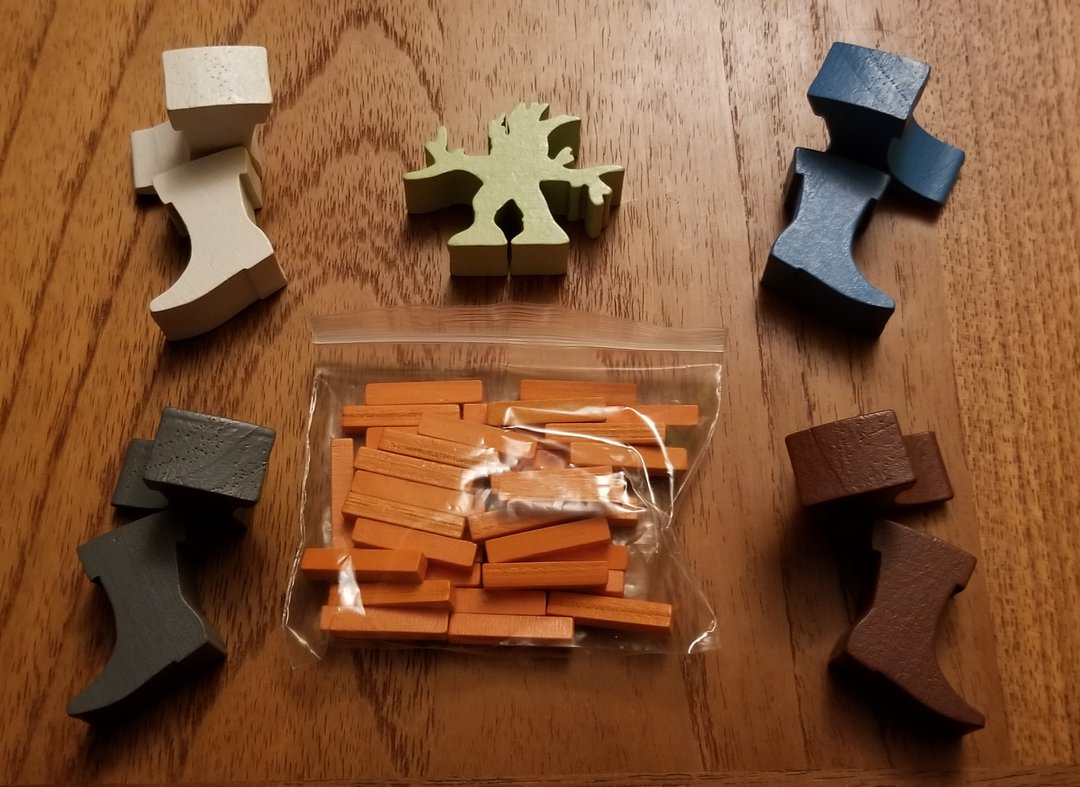
These boots were made for walkin'...over two hexes AT THE SAME TIME! Also featured: mage shields and a tree person.
The Aether In Between
While I was writing this article, I came across an interesting Tweet from a designer I follow. They were urging players of one of their own titles to always teach a base game first, never teaching it with all the expansion content included on the learning game. It was a caution they’d given me in person when I took one of their games for review, and a caution they give to the general masses for any game with expansions. There’s a lot of wisdom in those words, and I’m glad I followed them both at that time and was able to reconnect with them again with Archmage.
I’m not exactly sure what changed with me. Do I enjoy simple games more than I used to? Does a solid expansion just illuminate better for me the strengths of a solid base game? Am I just less excited by 3+ hours heavy games that I only rarely get to break out, driving me to seek simple yet in-depth titles more than I used to? I don’t have a good answer for you. It’s probably some combination of all those things. Perception is funny like that, the change only being apparent when looking back down the road you’ve been walking, seeing how far you’ve actually moved but not being conscious of how you got to where you’re standing. I can’t tell you how we got here, but for some strange reason I think Archmage is even more brilliant that it ever was. Yes, this piece started out as a look at the expansion content, but I think I’ve fallen in love with the core experience even more as a result.
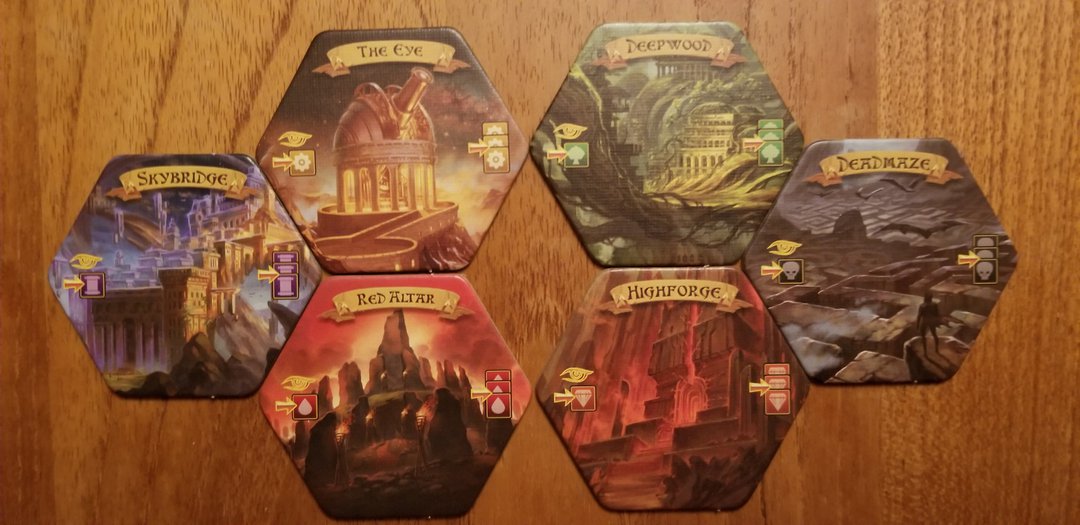
The expansion remains, as ever, a solid product. The artwork in this game is fantastic!
Layer a solid expansion onto an engagingly simple base game and what you have is a recipe that satisfies time and time again. Would I recommend Archmage: Ascension? Yes, I absolutely would, especially for owners of the base game. In some ways, games like these make even better recommendations to those growing a board game library of their own. If you need something simpler to introduce to new board gamers, a more straightforward base game is a great place to start. Layer in the expansion and you get a more complex experience for crowds that want more crunch in the cardboard or just something to keep plays fresh as a favorite title is brought out over and over again. Games with expansions that can pull double duty like this are always welcome on my shelf. And I think that’s where Archmage is going to stay, both for the lovely production and the things it’s shown me about my own changing taste in games. If you’re looking for a thematic title to put on your own shelves that does what this game does, and especially if you already own the base game, do yourself a favor and check out Archmage: Ascension. I think, like me, you’ll be glad you did.